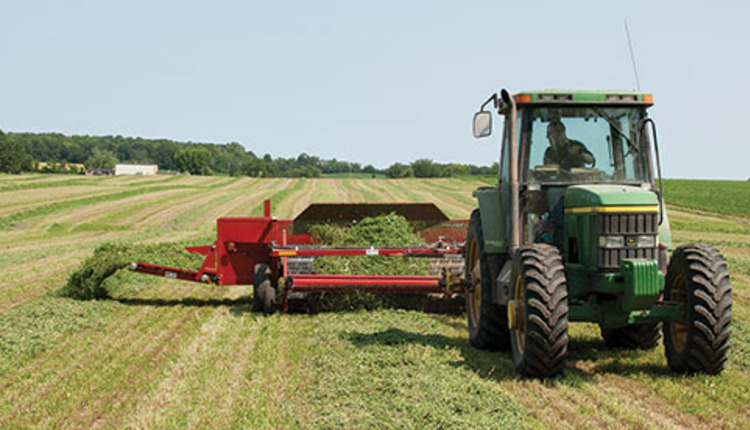Kathy Vander Kinter grew up on a 60-cow dairy farm in Fond du Lac County, Wis. After technical college, she married her husband, Luke, and moved to the Green Bay, Wis., area where she became an employee of his family’s custom harvesting business, Vander Kinter Farms, LLC. Today, Vander Kinter Farms is a third-generation, custom farming business comprised of six family members and several full and part-time employees.

The business offers all aspects of custom field operations from manure hauling, planting and forage harvesting to combining and custom trucking. Kathy does the bookkeeping for the business, helps with field operations when time allows and raises three young children: Michael (9), Matthew (7) and Olivia (4).
For the third consecutive year, Kathy serves as president of the Wisconsin Custom Operators (WCO). The WCO is an organization comprised of individuals throughout the state who derive their income in whole or part from providing custom farming services. Vander Kinter Farms is also an active member of the Professional Nutrient Applicators Association of Wisconsin, Midwest Forage Association and our local forage council.
Winter is winding down and spring will be here before we know it. In the business of custom fieldwork, many onlookers refer to the winter months as our “downtime.”
In actuality it is an opportune time to take a look at our business and determine where to make improvements and set goals for the upcoming season.
Meet with customers
This time of year is an ideal time to meet with current customers and potential new prospects. As a best practice, it’s good to meet with the farmer and discuss what went well during last year’s harvest, what could be improved, and, of course, determine the costs of services for the upcoming season.
During a time of low milk prices (like now), it’s in the best interest of both the farmer and the custom operator to know the expectations each one has for the other. When working with a prospective customer, understanding their needs and expectations of their custom operator is key to a positive business relationship. Building a relationship of trust and opening lines of communication prior to the season can prevent a lot of headaches and frustrations when it’s “go time.”
Safety is always a priority
Safety and maintenance know no season. We should all be doing daily maintenance and safety checks on all equipment such as checking oil levels, lubricating moving parts, checking lights, ensuring tire pressures are at recommended levels and so forth. Taking a little more time and doing a thorough inspection in the winter can prevent downtime, and in turn avoid lost profits, during the regular season.
Whether you schedule an appointment for your equipment with your local dealership or you perform the yearly maintenance yourself, it’s worth the time and money investment. While performing those maintenance checks, you should also be mindful of the safety equipment on board your machines. Make sure that the SMV (slow moving vehicle) signs are in good condition and mounted appropriately, fire extinguishers are charged, and all lights including the strobe lights are in tip-top order.
In its second year, the Wisconsin Custom Operators organization offers a safety certification program for members. Not only is regular maintenance good for safety, but taking it to the next level and training all your employees and family members in the safe operation of your equipment will prove profitable to your business.
Accident prevention in the workplace and operating today’s larger equipment are key topics that are covered in the program. Insurance companies have already taken interest in the certification program and are offering discounted rates to some customers for being WCO Safety Certified. To learn more, visit www.wiscustomoperators.org.
Evaluate employees
With spring drawing near, now is the time to do a little housekeeping in the human resource department. Reflecting on the question “Would I want to work for me?” can make a big difference in the attitudes of your employees and family members. Self-evaluation is also critical to retaining the outstanding employees you already have working for you.
Take the time if you haven’t already to develop a basic employee handbook where all of your expectations and disciplinary measures are clearly defined. This will help in the future if there is ever a question about responsibility or what measures are taken as a follow up.
When interviewing a potential new hire, ask enough questions to understand the candidate’s abilities. Make a list of all the capabilities that the new hire has and put the list in their file; then revisit that list in six to 12 months. Has the employee lived up to those capabilities? This in turn becomes a great tool for you to use in reviewing individual employees and possibly determining a promotion, pay raise or maybe even a termination.
Lastly, of course, life is short. Do what makes you happy. Take a vacation. Spend time with family and friends. Laugh and enjoy life!
Finally, from one custom operator to another, the next time someone asks what you are doing in the off-season . . . you can reply “What off-season?!”
This article appeared in the March 2016 issue of Hay & Forage Grower on page 16.
Not a subscriber? Click to get the print magazine.

